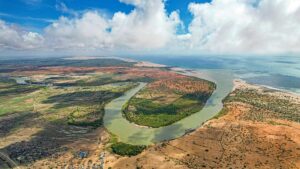- SIWI – Leading expert in water governance
- /
- Latest
- /
- Why water governance is key to tackling climate change
Why water governance is key to tackling climate change

The 2020 UN World Water Development Report looks at the complex interlinkages between water and climate. As climate change amplifies water-related extremes, it clearly demonstrates the importance of good water governance, write SIWI’s Maggie White and Marianne Kjellén from UNDP, two of the experts who contributed to the report.

The UN World Water Development Report is the annual flagship report of UN-Water. The report is produced by UNESCO’s World Water Assessment Programme and builds on contributions from water experts from leading international organizations. The 2020 edition, focusing on Water and Climate Change, draws attention to the critical linkages between water and climate change in the context of sustainable development. It also serves as a guide for concrete actions to address these challenges.
Climate change affects – and is affected by – global water resources. It reduces the predictability of water availability and affects water quality. Climate change also increases the occurrence and magnitude of extreme weather events, such as storms, floods and droughts. This harms ecosystems and societies, threatening biodiversity and sustainable social-economic development.
Naturally, this has major implications for water resources and the management of these water resources within a country and across its borders. What is at stake is nothing less than food security, human health, energy production, and biodiversity. The world’s poorest and most vulnerable women, men, children and elderly face the greatest risks, This exacerbates existing social inequalities and can lead to further social strife, forced migration and conflict.
In the face of such major challenges, climate policy must increasingly be about good water management. We cannot just continue to increase water use without ensuring the necessary recharge and protection of resources. As water availability becomes more unpredictable in large parts of the world – from droughts, floods and storms – we need landscapes that not only mitigate the impacts of flooding and drought, but that also capture both runoff and wastewater in order to reuse them, reduce water extraction and enable to recharge the soils . Another important factor in future water management is how climate change generates additional risks to water-related infrastructure, revealing also pre-existing threats to water management. Increased weather uncertainties require a new kind of resilient governance approach, which is more flexible and focused on addressing ‘everyday risks’, especially for people most at risk from poverty and vulnerability.
As droughts are prolonged and water becomes scarcer, technical fixes and supply augmentation will not be sufficient. Instead, we need more efficient use (and reuse) of water and more equitable processes for sharing the benefits. This requires a participatory, just and transparent approach, especially when it comes to trade-offs between different interests.
Water governance research has highlighted the important role of participation to address complex water issues, with citizens, civil society, local authorities and the private sector included. Studies also show that marginalized groups are especially at risk, since both sudden and gradual crisis events tend to reinforce already existing vulnerabilities, exposure and inequalities. Good water governance means ensuring that all people get a say in water decisions of importance to them.
It is also important to note how water management can play a very important role in climate change mitigation. Specific water management interventions such as wetland protection, conservation agriculture and other nature-based solutions can help to sequester carbon in biomass and soils, while improved wastewater treatment can help reduce greenhouse gas emissions while supplying biogas as a source of renewable energy.
The climate crisis is indeed a water crisis. To address it effectively, we need good water governance.
Most recent

Why sharing data matters for water cooperation in the Juba–Shebelle Basin
- Transboundary Water Cooperation
- Water and climate

TIARA in Zambia: Scaling resilient rainfed agriculture in the Zambezi Basin
- Agriculture and water
- Freshwater and ecosystems/biodiversity
- Resilience through water
- Water in landscapes
- Water and climate

Why climate action must integrate water
- Water and climate
- World Water Week
- Water governance

Water at the heart of climate action: SIWI shapes the future of the GCAA

SIWI-WASH experts join IVL

SIWI Amman hosts Ghana representatives for WASH exposure visit in Jordan

